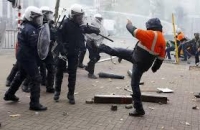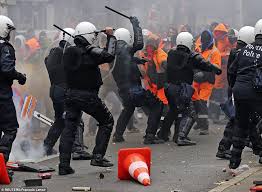The Third Set of Brussels Youth Riots, ‘Everybody in power, no one in charge’
Monday 27 November, 2017 Written by Youssef Kobo, Politico
Brussels: ‘Everybody in power, no one in charge’. The third set of youth riots in two weeks in Brussels took place in the upmarket Louise shopping district Saturday evening.
For the second time in less than a week, Brussels police were confronted by spontaneous outbursts of violence involving local youths. The amateurism and the clumsiness of the political response that followed is telling of the pitfalls of Brussels politics. Social problems that have gone unaddressed for years have finally erupted — and the city is ill-equipped to deal with them.
On Saturday, a gathering turned violent when riot police cornered hundreds of football supporters celebrating Morocco’s qualification for the 2018 World Cup. Four days later, lightning struck again when a meet and greet with a celebrity vlogger and his young fanbase spun out of control. Again local authorities were caught on the back foot: Additional forces had to be called in at the very last minute and city council members were at a loss to explain how a new riot could erupt just a stone’s throw from the scene of the last one.
The Brussels Region — the unwanted lovechild of two feuding parents, Flanders and Wallonia — has always suffered from a lack of the strong leadership, guidance and vision a metropolis of its stature deserves.
With its incomprehensible institutional structures and infinite layers of government, even the most experienced lawmakers find it difficult to make the smallest dent on local legislation. For more than three decades problems like poverty, unemployment, violence, crime and radicalization were met with a brush of indifference by local politicians. As the old adage goes “in Brussels everybody is in power, but nobody is responsible.”
“This type of asymmetric governance and the total fragmentation of power have done the city no good”
Belgians often joke that their capital has the highest rate of politicians per capita. What makes policymaking so intractable in Brussels is that it’s the only region in the country governed by political parties from both language areas. The main governing bodies of the Brussels-Capital Region are overseen by the Brussels government, the Flemish-language community and the French-language community. There’s also a Brussels parliament and 19 different municipalities boasting their own full-fledged administration and city council. The Flemish-speakers and the French-speakers have distinct political cultures and sometimes conflicting agendas. The result is often chaotic.
This type of asymmetric governance and the total fragmentation of power have done the city no good.
In the last decade, Brussels has witnessed a serious population boom; it has grown by 200,000 people. The city’s infrastructure and services are stretched to their absolute limit, and another 250,000 people are expected to arrive in the coming 10 years.
After three decades of total neglect by local politicians, certain areas in municipalities such as Molenbeek, Schaerbeek and Anderlecht suffer 30-50 percent unemployment rates among youth. More than a third drop out of secondary school without a degree; some fall victim to a life of petty crime and drugs.
This environment provides the perfect breeding ground for alienation and resentment among certain disadvantaged youth. This became all too obvious as the city saw 200 of its residents join terrorist groups in Syria in just three years. Six international terrorist attacks or foiled plots have been linked to extremists using the city as a base or a hideout.

Image: Brussels Youth Riots
Brussels’ youth feel abandoned and betrayed by the political class — not to mention law enforcement. But instead of tackling these issues, many local politicians choose to ignore them in an attempt to keep the peace.
This week’s riots bare an uncanny resemblance to the infamous riots in the French banlieues in 2005 and the London riots of 2011. On both occasions, local authorities found themselves overwhelmed by the rapid explosion of violence among inner-city youth. And politicians, journalists, pundits and researchers struggled to come up with an explanation for the city-wide mayhem.
“Brussels politicians have mostly responded by issuing calls for harsher police action and bans against gatherings in public spaces”
Brussels politicians have mostly responded by issuing calls for harsher police action and bans against gatherings in public spaces. But none have come up with answers, not to mention proposed solutions. And for all the speculation in the press about what caused the violent uproar, no one has tried to find out what the young people involved are saying.
To be sure, the impossible Gordian knot of the city’s politics is an extra hurdle for lawmakers trying to make a change for the better. But as long as Brussels’ lawmakers fail to tackle the wider causes at the root of this week’s events — mass unemployment and poverty; a disillusioned, alienated youth lacking in opportunities; and an increasing gap between the city’s establishment and its citizens — the EU’s capital will remain a city in permanent disarray. And the threat of further violence will only grow.
Author: Youssef Kobo, a former adviser to the Brussels secretary of equal opportunities, is a communications adviser, social entrepreneur and a member of the Flemish Christian Democratic Party, CD&V.
1 comment
-
Comment Link
 Monday 27 November, 2017
posted by
Simon Collyer
Monday 27 November, 2017
posted by
Simon Collyer
Leave a comment
Make sure you enter all the required information, indicated by an asterisk (*). HTML code is not allowed.
Join
FREE
Here










